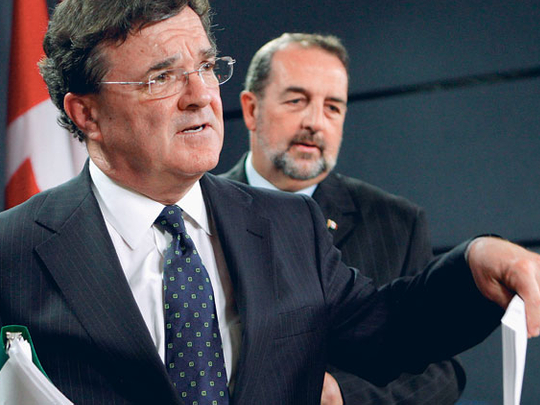
Busan: The Group of 20 nations failed to agree on a proposal to impose a global tax on banks that was aimed at making the financial industry shoulder the cost of bailouts, settling instead for a common set of guidelines.
G20 finance ministers and central bank governors said in a statement in Busan, South Korea, that governments will take account of each nation's "circumstances and options".
The result allows nations such as Canada, China and Brazil, whose banks suffered less during the global financial crisis, to skip introducing a tax. European countries and the US have advocated the levy.
"If we're living in an ideal world, a global financial tax would be a good idea, but in reality it is almost impossible to implement," said Tomo Kinoshita, an economist at Nomura Holdings Inc. in Hong Kong. "There are too many obstacles."
Saturday's statement leaves in place an initiative to seek tighter global standards for capital levels at banks, which is a "more practical" way to help reduce the risk of financial crises, Kinoshita said. Banks have opposed the effort, warning that the costs may curb credit expansion and economic growth.
European governments and the US have advocated a bank tax to be adopted in every major country to prevent lenders from relocating to jurisdictions that don't charge the levy. The International Monetary Fund was asked by the G20 last year to recommend how to tax the industry.
Ministers Saturday said they now recognised that there's a "range of policy options" open to countries and agreed instead to adopt "principles" that protect taxpayers and reduce the risks of further crises.
Canadian Finance Minister Jim Flaherty, speaking at a press briefing at the conclusion of the two-day G20 gathering in Busan, said the plan lacked majority backing among G20 nations and is a "distraction". He said "there is no agreement" to proceed with a tax.
Instead, Canada has proposed that countries force lenders to keep "contingent capital" on hand to ensure taxpayers don't end up paying the bill for any future bailouts. Such securities could convert to equity in a time of crisis to ensure that lenders remain well capitalised.
Uniformity
The IMF recommended that financial institutions' non-deposit liabilities and the sum of their profit and compensation should be taxed to help pay for future bailouts. Led by Canadian opposition, G20 officials at a meeting in Washington pushed back talks by ordering the IMF to study the issue further.
"The problem is not uniformity, the problem is to do things which are consistent and that do not create arbitrage in terms of regulation and taxation," the fund's Managing Director Dominique Strauss-Kahn said in Busan, Korea's second-largest city. The principles will be written in a way that avoids inconsistency in the different systems, he said. The G20 separately said that "it is critical that our banking regulators develop capital and liquidity rules" tough enough to ensure lenders can withstand further crises. The rules should be agreed by November, with implementation targeted for the end of 2012, the statement said.
At stake for banks is the potential need to raise as much as $375 billion (Dh1.38 trillion) in fresh capital under the proposals being discussed, according to estimates by UBS AG. JPMorgan Chase & Co predicted in February that annual earnings at 13 of the largest banks would drop by $20 billion.
Michel Pebereau, chairman of BNP Paribas SA, France's largest bank, and Clemens Boersig, chairman of Deutsche Bank AG, Germany's biggest, wrote to G20 leaders last month on behalf of the European Financial Services Round Table, a lobbying group, saying the new rules would harm bank lending more than capital markets. "Most European countries mainly have a banking-dominated financial system," they wrote, noting that credit outstanding as a percentage of gross domestic product is almost twice as high in the 27-nation EU as in the US.
US banks have made opposite arguments in their meetings with regulators and in letters to the Basel committee: The rules will harm them more than European and Asian lenders. New definitions of capital wouldn't count certain assets used only by US banks, and the liquidity standards underrate the stability of deposits insured by the Federal Deposit Insurance Corp., the lenders said.
"A fair degree of national discretion will be essential," the American Bankers Association wrote in April.
Chancellor of the Exchequer George Osborne said that Britain will push ahead with a plan to implement a tax and that he will unveil further details in his June 22 budget. The UK wants tax revenue to finance general government expenditure, marking it aside from other European nations who want the tax to fund future bailouts.
"If one country goes alone in the bank tax, there will be a risk of regulatory arbitrage," said Venkatraman Anantha- Nageswaran, who helps manage $140 billion in assets as global chief investment officer at Bank Julius Baer & Co.












